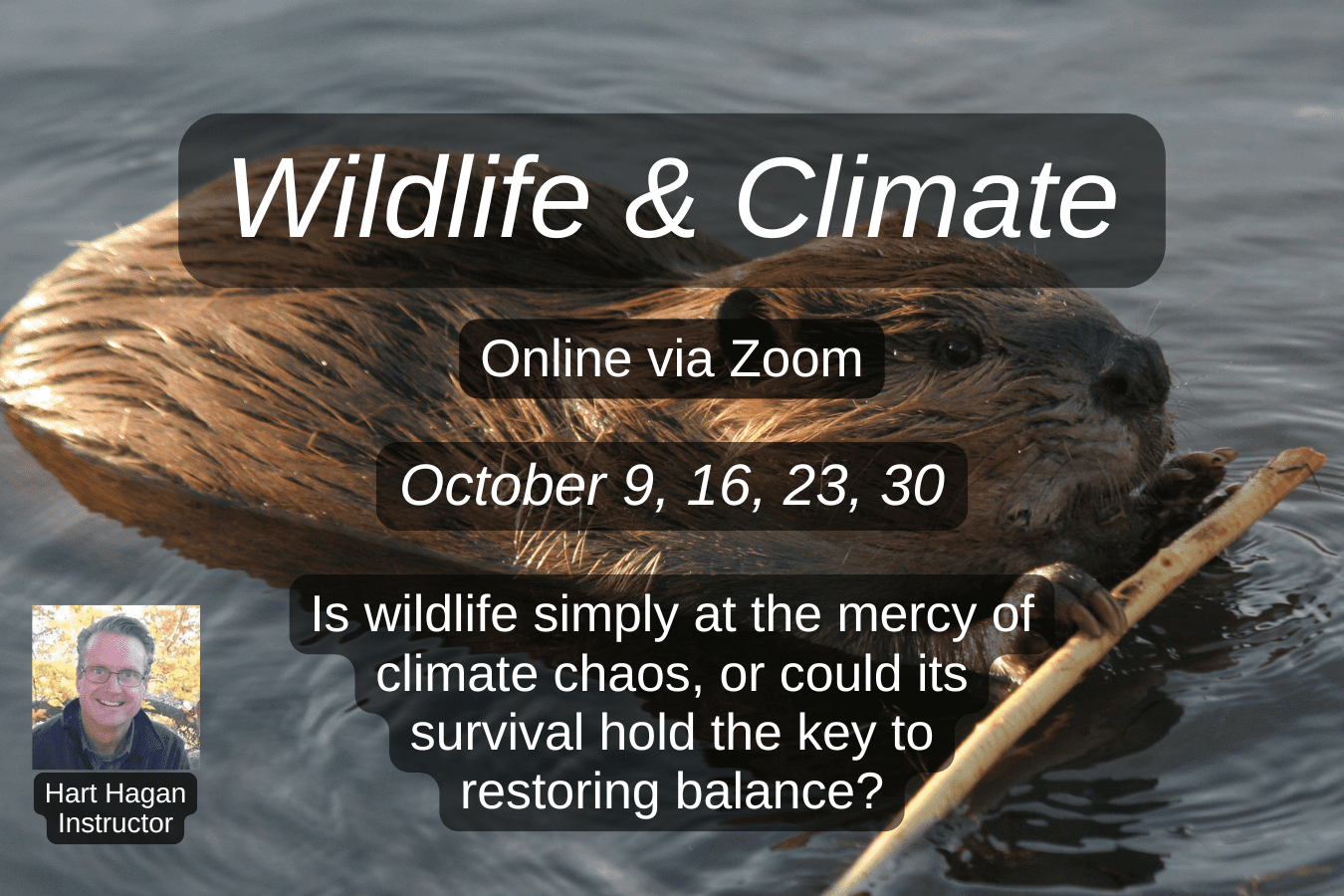Wildlife & Climate
Is wildlife simply at the mercy of climate chaos, or could
its survival hold the key to restoring balance?
October 9, 16, 23 & 30
Thursdays — 12:00 Noon & 7:00 PM ET
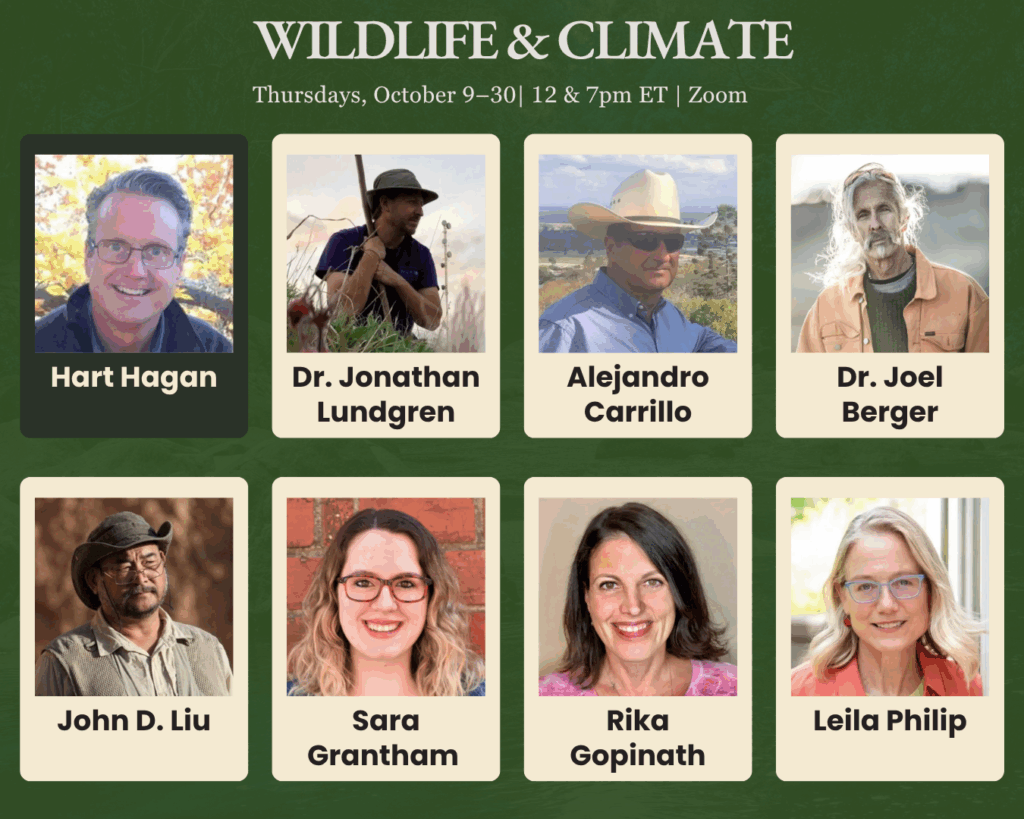
Free Introductory Webinars
The Worldwide Loss of Soil Moisture
with Hart Hagan
Friday, October 17
3:00 PM ET
Insect Decline: Problems & Solutions
with Hart Hagan
Monday, October 20
7:00 PM ET
According to this report from the World Wildlife Fund (WWF), we have lost 73% of wildlife (vertebrates) in the last 50 years.
This 73% decline is both “staggering” and “catastrophic,” to quote the WWF.
The conventional wisdom is that climate change is causing this loss, but this idea has almost no scientific support, according to this article by conservation biologists: An inconvenient misconception: Climate change is not the principal driver of biodiversity loss, published in Conservation Letters, a journal of the Society for Conservation Biology.
The article holds that conservation biologists do not list climate change as a frequent cause of wildlife extinctions. Instead, they list habitat loss (e.g., deforestation), pollution (including pesticides) and overexploitation (overhunting and overfishing) as major causes of wildlife extinctions.
So, saving our wildlife requires that we deal with the real causes and not be swept up in a false narrative about how climate change, per se, is the culprit.
Besides, forests, wetlands and grasslands serve as habitat AND climate regulators. So we have a powerful rationale for protecting–and creating–habitat in our farms, our forests, our landscapes and even our deserts.
Furthermore, wildlife is an essential component of each ecosystem. Every species plays a role in the function of an ecosystem as a whole, including the roles of our ecosystems in regulating a livable climate. Thus humans and all of the other species depend on wildlife for our survival, providing an extra incentive for us to create the conditions for wildlife to return and thrive by restoring their habitat and food supply.
Finally, according to Canadian scientist Vaclav Smil, we have eliminated 50% of the Earth’s biomass in the last 5,000 years. If we could reverse this trend, we could regain some of the habitat and climate regulating capacity that we have lost.
Combine this with the idea that the total quantity of human made things (known as anthropogenic mass), now equals the biomass of the world, and is set to double and redouble in this century.We are literally crowding out nature. If we don’t stop, it will not matter how much we reduce emissions.
We can live with nature. We can be a keystone species, creating habitat for other species. But we need to understand what’s going on and not be deceived by those who want us to ignore nature or make token changes, changes that are profitable for business but not people or the planet. We need real change, without which we will never address climate change.
This course explores the actual connections between wildlife and climate change and gives us a real and viable framework for living with nature, restoring habitat and addressing climate change in a way that actually works and can be implemented wherever we live, work and play.
What’s Included in the Course
- Live Classes every week! A 12:00 Noon and 7:00 PM live, 90-minute class each week on Zoom for a total of 10 live sessions, recorded for your convenience
- Thursdays – October 9, 16, 23 & 30, 2025 – from 12:00 – 1:30 PM and 7:00 – 8:30 PM ET (attend either or both classes)
- Guest Speakers will share their research and experience
- Membership in a private email group to ask questions, share resources and connect with a like-minded community
- Advocacy Coaching for you to be effective in your community
- Plus Resources you can use to help decision makers create truly effective climate action plans.
Reserve your spot today!
Special Guest Speakers
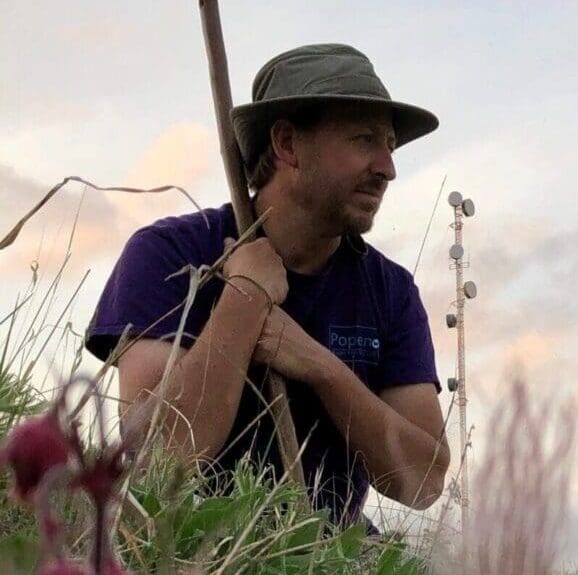
Jonathan Lundgren, PhD
October 9 – 12:00 noon ET
Dr. Jonathan Lundgren is an agroecologist, Executive Director of Ecdysis Foundation, and CEO for Blue Dasher Farm, in South Dakota. Lundgren’s research and education programs are helping applied science evolve in ways that foster the evolution of a regenerative food system. He regularly interacts with the public and farmers around the world regarding ecologically intensive farming and how biodiversity fuels the resilience and productivity of an agroecosystem and rural communities.
To view his important work, visit Ecdysis Foundation.
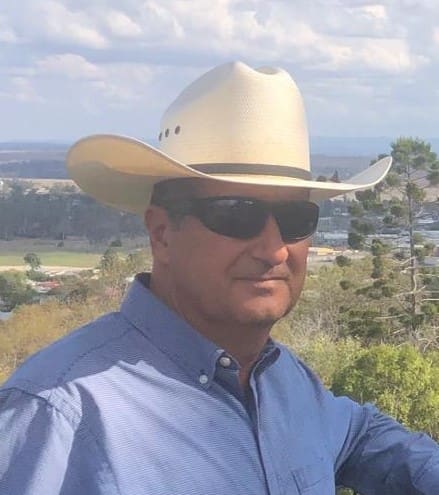
Alejandro Carrillo
October 9 – 7:00 PM ET
Alejandro Carrillo is a fourth-generation rancher in the Chihuahuan desert. Rarely does his precipitation go beyond 9” per year (< 225mm). He is not willing to waste any water in such a brittle environment because he wants to graze year-round without inputs (such as irrigation, seeds and fertilizer).
Alejandro’s ranch, Las Damas Cattle Ranch, has been part of multiple documentaries and studies focused on regenerative ranching and “greening the desert” using livestock such as Common Ground, Sacred Cow, To Which We Belong, and Water in Plain Sight.
Alejandro’s Grasslands Regeneration Project company assists ranchers and organizations on regenerative grazing projects in the Americas, Europe, Africa, Australia, China and the Middle-East. He also participates as a delegate to the United Nations Convention to Combat Desertification.
Before joining the ranch, Alejandro worked as a software engineer in multiple countries. He holds a MS in Technical Management from The Johns Hopkins University and BS in Computer Science from the Monterrey Institute of Technology.
To view his important work, visit Grasslands Regeneration Project.
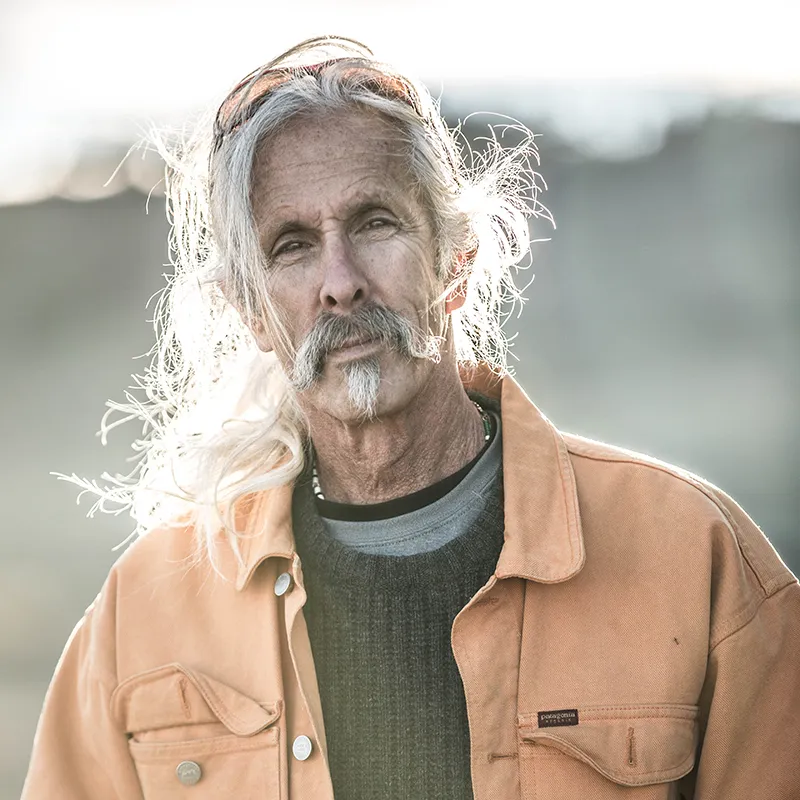
Joel Berger, PhD
October 16 – 12:00 noon ET
Dr. Joel Berger is a wildlife conservation biologist known for his research on large mammals and their survival in changing environments. He holds the Barbara Cox Anthony Chair in Wildlife Conservation at Colorado State University and is a senior scientist with the Wildlife Conservation Society (WCS). Much of his work focuses on species at the edge of survival from muskoxen in the Arctic, to wild yak in the Himalayas, to saiga antelope in Mongolia.
Across decades of fieldwork, Berger has investigated how climate change, habitat loss, and human-wildlife conflict affect animal populations. He is particularly interested in:
Using science and storytelling to influence conservation policy, often by drawing attention to overlooked species or ecosystems.
How large mammals adapt – or fail to adapt – to rapidly shifting climates and landscapes.
The intersection of human activity (development, hunting, resource extraction) with wildlife survival.
He is a coauthor of the influential paper “An inconvenient misconception: Climate change is not the principal driver of biodiversity loss,” which helped inspire this course.
To watch his video, visit YouTube
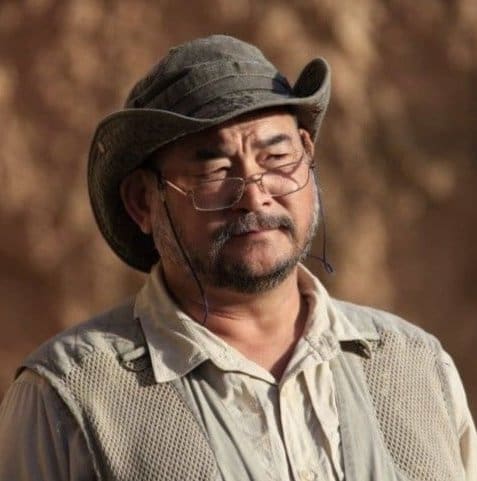
John D. Liu
October 16 – 7:00 PM ET
John D. Liu worked as a television producer and camera man for CBS News, RAI, and ZDF in the 1980s and 1990s covering geo-political events including the rise of China from poverty and isolation and the collapse of the Soviet Union. In the mid-1990s the World Bank asked John to document the extraordinary rehabilitation of the Loess Plateau.
Since learning that it is possible to rehabilitate large-scale damaged ecosystems John has devoted his life to understanding and communicating about the potential and responsibility to restore degraded landscapes on a planetary scale.
Since 2009 John has worked with Willem Ferwerda the Founder and CEO of the Commonland Foundation, which is catalyzing privately invested large-scale restoration in many parts of the world. John is also the founder of the Ecosystem Restoration Camps movement that began in 2016 and has grown to currently 80 camps in 6 continents and continues to grow.
Mr Liu, has produced, filmed, written, directed and presented numerous films on Environment and Ecology for the BBC, National Geographic, Discovery, PBS and other networks. John also spent 3 years as senior research fellow for the International Union for the Conservation of Nature (IUCN) and has also had numerous academic fellowships in the UK, Netherlands, and the United States, China, and Costa Rica.
For further insights into his work, visit ERC Earth and Commonland Foundation.
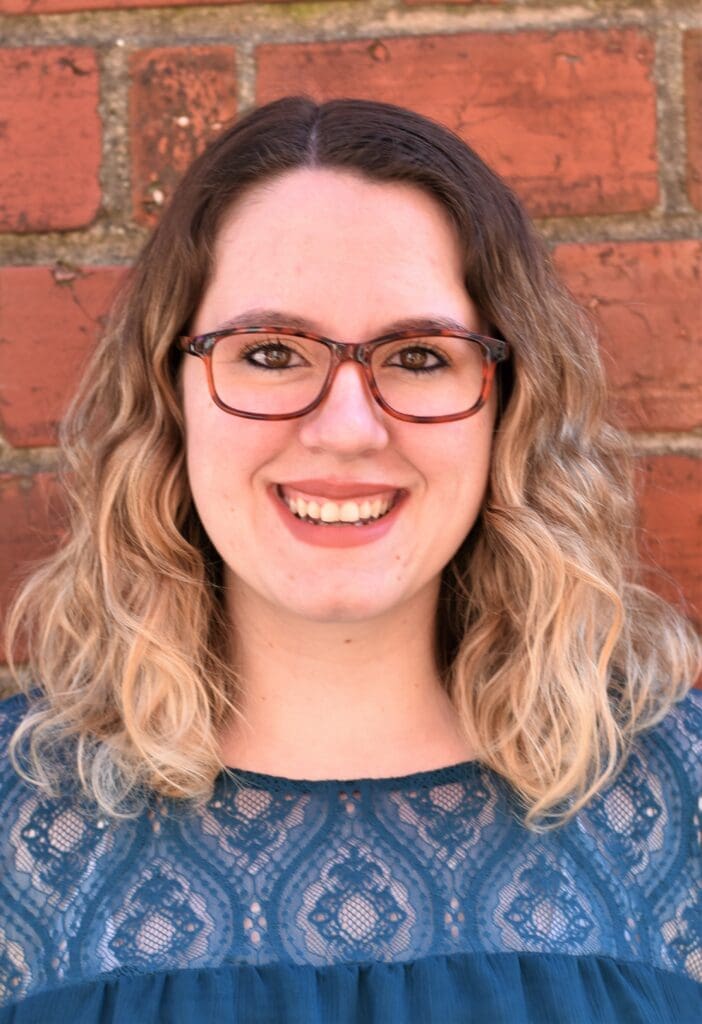
Sara Grantham
October 23 – 12:00 noon ET
Sara Grantham is the Science, Regulatory, and Advocacy Manager at Beyond Pesticides, where she advances science-driven advocacy to protect public health and the environment. She holds dual bachelor’s degrees in Biology and Marine/Environmental Science and a master’s in Chemical and Life Sciences. Inspired early by Rachel Carson’s work on the dangers of DDT, Sara has built a career at the intersection of research and advocacy, spanning cancer research, marine ecotoxicology, and science education. Drawing on this diverse background, she translates complex science into meaningful action, working to safeguard communities locally while shaping environmental protection on a global scale.
To learn more about her important work, visit Beyond Pesticides.

Rika Gopinath
October 23 – 12:00 noon ET
Rika Gopinath is the Community Policy and Action Manager at Beyond Pesticides, where she leads the Parks for a Sustainable Future program. With a long history of grassroots leadership in California, she has served as a founding member and chair of YardSmart Marin, and as co-chair of Moms Advocating Sustainability, a San Francisco Bay Area organization dedicated to protecting children from toxic exposures in homes and environments. Drawing on years of community advocacy, Rika brings both practical experience and policy insight to her work, championing sustainable practices that prioritize public health and ecological resilience.
To learn more about her important work, visit Beyond Pesticides.

Leila Philip
October 30 – 12:00 noon ET
Leila Philip is an award-winning author whose nonfiction books chronicle personal journeys across cultures and landscapes, from apprenticing with a master potter in Japan (The Road Through Miyama) to exploring her family’s Hudson Valley farm (A Family Place). A Guggenheim Fellow and recipient of fellowships from the National Endowment for the Arts and Humanities, she also publishes poetry, essays, and theatrical scripts, and is currently working on a documentary film. Leila has been a contributing columnist for the Boston Globe and teaches in the Environmental Studies Program at the College of the Holy Cross, where she is Professor of English.
Why Leila Philip wrote the book Beaverland
Leila writes to know about the world and her place in it. She writes to better understand and connect with worlds, ideas and realities that are not her own. She researches and documents and observes as rigorously as she can, then she sits down at her desk and tries to make sense of all that she has taken in. For Leila, writing is always a journey with a wonderfully uncertain end; Leila writes to discover what she doesn’t know yet. She strives to find the story, then shape that story with words and share. We live in a time of ongoing environmental crisis and fear is an appropriate response once we acknowledge the extent to which we have altered every aspect of life on earth. But so is hope. In writing Beaverland, Leila discovered the natural wonder of beavers and the powerful ways they restore damaged environments. Beavers demonstrate the incredible powers of resilience and healing available to us as concrete solutions to help us meet the urgent challenges of climate change. Beavers can teach us. We can learn.
To gain more insight into her work, visit Leila Philip’s website.
Your Course Instructor
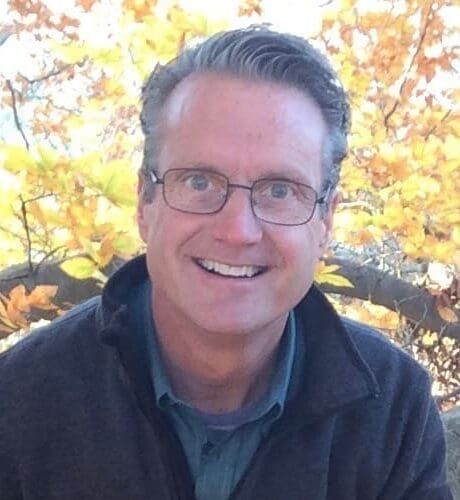
Hart Hagan
Hart Hagan is an environmental reporter who has produced nearly 400 radio shows and close to 300 videos since 2018. He is the founder of Water & Climate, a Facebook group with over 4,600 members. Six years as a climate reporter has led him to focus on the value of ecosystems and water cycles as a key driver of climate, and the primary means of curbing extinction and providing habitat for our fellow species.
Hart is passionate about educating people that in order to understand flooding, drought, heatwaves and wildfires, we must look beyond CO2 and examine how we treat our land. He is an avid gardener with a focus on native wildflowers and creating landscapes that capture all the rainfall.
Hart is also an educator, a native plant expert, an Accredited Organic Land Care Professional certified through the Northeast Organic Farming Association, and he has been trained by the Savory Institute in the ecological evaluation of pastures through a process known as Ecological Outcome Verification.
To review and subscribe to Hart’s important work, visit his:
YouTube Channel: @harthagan23
Blog on Substack: harthagan.substack.com
Facebook Group: Water & Climate
Whether this is your first course or your tenth course, please join us if you are curious about nature and its power to restore the soil and other ecosystems to abundance. Everyone has much to learn and share, and there is much to be done. We are all on a journey of expanding our knowledge on nature’s climate solutions, and we each bring something valuable to the conversation.
If you have any registration or general course questions, email us at courses@bio4climate.org. If you have specific questions about the course for Hart Hagan, you can contact him at nhhagan@gmail.com.

